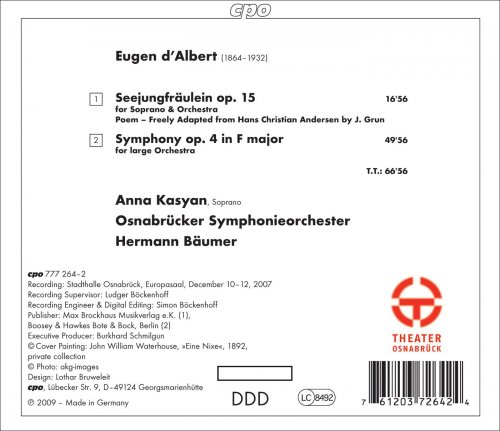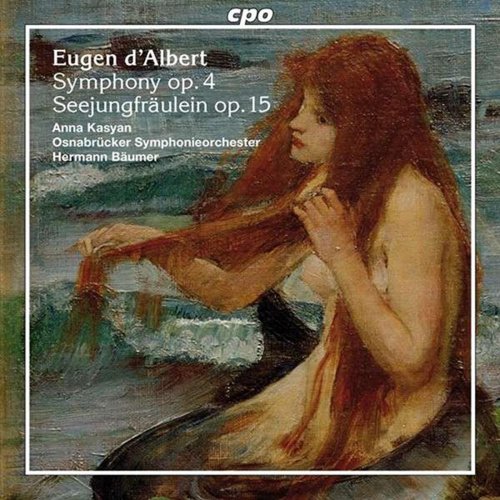
Anna Kasyan, Osnabruecker Symphonieorchester, Hermann Bäumer - Albert: Symphony, Op. 4 / Seejungfraulein (2010)
BAND/ARTIST: Anna Kasyan, Osnabruecker Symphonieorchester, Hermann Bäumer
- Title: Albert: Symphony, Op. 4 / Seejungfraulein
- Year Of Release: 2010
- Label: CPO
- Genre: Classical
- Quality: flac lossless (tracks) +Booklet
- Total Time: 01:06:54
- Total Size: 282 mb
- WebSite: Album Preview
Tracklist
01. Seejungfraulein, Op. 15
02. Symphony in F Major, Op. 4: I. Massig bewegt
03. Symphony in F Major, Op. 4: II. Langsam, aber nicht schleppend
04. Symphony in F Major, Op. 4: III. Sehr schnell
05. Symphony in F Major, Op. 4: IV. Massig langsam - Belebt

One composer damned to musty obscurity not too long ago was Eugen d'Albert; while regarded as one of history's legendary pianists, his composing activity - which spans an especially interesting period from the 1880s to the early '30s - was seen as a stick-in-the-mud retention of German post-romanticism and therefore an unnecessary pursuit. However, his 1903 operetta Tiefland never left the repertory of the German-speaking stage, and it is the Theater Osnabrück that is co-branding CPO's release Eugen d'Albert: Symphony Op. 4 - Seejungfrauen Op. 15, which features the in-house symphony, the Osnabrücker Symphonieorchester under the baton of general music director Hermann Bäumer. The Osnabrück Symphony is a notably compact band usually numbering around 45 pieces, but it has a big sound nonetheless, captured generously in this fine CPO recording.
Another notable thing about this CD is the recording debut of Anna Kasyan, an Armenian-Georgian soprano who has been making waves mainly in France and Belgium. She turned to singing after studying piano and violin and her voice has a light, lovely, and fresh musicality to it that is well-suited to d'Albert's Seejungfrauen (The Mermaid, 1899), an unusual piece in that it's an orchestral tone poem in which the poem itself - based on Hans Christian Anderson's "The Little Mermaid" - is intact by way of a vocal setting of the text included within the orchestral texture itself; this is not a standard voice/orchestral lieder. The music of Richard Strauss comes to mind, and it can be said of this work that it is certainly not inferior to what Strauss himself might have produced had he taken up this theme. The Symphony in F major, Op. 4 (1884), is early and an extremely assured work for a composer who was then pushing the tender age of 20; Strauss heard it in the late 1880s and expressed his admiration for it, and the premiere was given in 1894 by Hans von Bülow. This would be the only symphony d'Albert would compose and it is stylistically rather straightforward and uncomplicated, though it runs rather long at 50 minutes. It can be seen as a typical Beethovenian symphony updated to certain integrity of Brahmsian post-romantic behavior, but in 1884 that would not have been considered reactionary. It has been recorded once before and combined with d'Albert's Cello Concerto, but certainly a second recording of a work so obscure and deserving is welcome.
The English translation of the liner notes is exceptionally poor for CPO and the level of research into the original German notes is way below the label's usual standards. These seem reliant on decades-old received wisdom about d'Albert and are not in step with easily established currents; the First Piano Concerto in B minor is not lost and has been recorded -- twice -- and d'Albert's many recordings, which have been released on CD, are revelatory and speak well for his virtuosity: they are not, in the main, "eccentric, undisciplined, and full of wrong notes." While one recoils from the idea of suggesting that a classical album note writer should practice self-censorship, there's something to be said for supporting the project one is annotating and to get hip with the generally accepted and most reasonably updated information on the subject of the writing. Apart from that, d'Albert's music here should please any connoisseur of the late romantic and both recording and performance in CPO's Eugen d'Albert: Symphony Op. 4 - Seejungfrauen Op. 15 are done exceptionally well.
01. Seejungfraulein, Op. 15
02. Symphony in F Major, Op. 4: I. Massig bewegt
03. Symphony in F Major, Op. 4: II. Langsam, aber nicht schleppend
04. Symphony in F Major, Op. 4: III. Sehr schnell
05. Symphony in F Major, Op. 4: IV. Massig langsam - Belebt

One composer damned to musty obscurity not too long ago was Eugen d'Albert; while regarded as one of history's legendary pianists, his composing activity - which spans an especially interesting period from the 1880s to the early '30s - was seen as a stick-in-the-mud retention of German post-romanticism and therefore an unnecessary pursuit. However, his 1903 operetta Tiefland never left the repertory of the German-speaking stage, and it is the Theater Osnabrück that is co-branding CPO's release Eugen d'Albert: Symphony Op. 4 - Seejungfrauen Op. 15, which features the in-house symphony, the Osnabrücker Symphonieorchester under the baton of general music director Hermann Bäumer. The Osnabrück Symphony is a notably compact band usually numbering around 45 pieces, but it has a big sound nonetheless, captured generously in this fine CPO recording.
Another notable thing about this CD is the recording debut of Anna Kasyan, an Armenian-Georgian soprano who has been making waves mainly in France and Belgium. She turned to singing after studying piano and violin and her voice has a light, lovely, and fresh musicality to it that is well-suited to d'Albert's Seejungfrauen (The Mermaid, 1899), an unusual piece in that it's an orchestral tone poem in which the poem itself - based on Hans Christian Anderson's "The Little Mermaid" - is intact by way of a vocal setting of the text included within the orchestral texture itself; this is not a standard voice/orchestral lieder. The music of Richard Strauss comes to mind, and it can be said of this work that it is certainly not inferior to what Strauss himself might have produced had he taken up this theme. The Symphony in F major, Op. 4 (1884), is early and an extremely assured work for a composer who was then pushing the tender age of 20; Strauss heard it in the late 1880s and expressed his admiration for it, and the premiere was given in 1894 by Hans von Bülow. This would be the only symphony d'Albert would compose and it is stylistically rather straightforward and uncomplicated, though it runs rather long at 50 minutes. It can be seen as a typical Beethovenian symphony updated to certain integrity of Brahmsian post-romantic behavior, but in 1884 that would not have been considered reactionary. It has been recorded once before and combined with d'Albert's Cello Concerto, but certainly a second recording of a work so obscure and deserving is welcome.
The English translation of the liner notes is exceptionally poor for CPO and the level of research into the original German notes is way below the label's usual standards. These seem reliant on decades-old received wisdom about d'Albert and are not in step with easily established currents; the First Piano Concerto in B minor is not lost and has been recorded -- twice -- and d'Albert's many recordings, which have been released on CD, are revelatory and speak well for his virtuosity: they are not, in the main, "eccentric, undisciplined, and full of wrong notes." While one recoils from the idea of suggesting that a classical album note writer should practice self-censorship, there's something to be said for supporting the project one is annotating and to get hip with the generally accepted and most reasonably updated information on the subject of the writing. Apart from that, d'Albert's music here should please any connoisseur of the late romantic and both recording and performance in CPO's Eugen d'Albert: Symphony Op. 4 - Seejungfrauen Op. 15 are done exceptionally well.
As a ISRA.CLOUD's PREMIUM member you will have the following benefits:
- Unlimited high speed downloads
- Download directly without waiting time
- Unlimited parallel downloads
- Support for download accelerators
- No advertising
- Resume broken downloads


